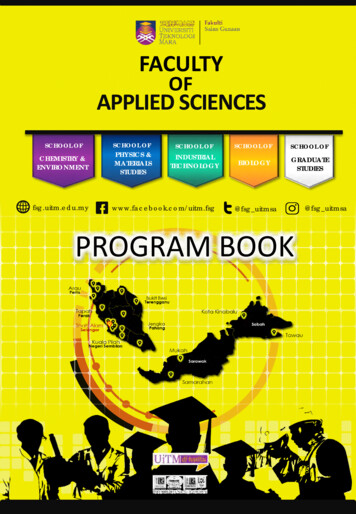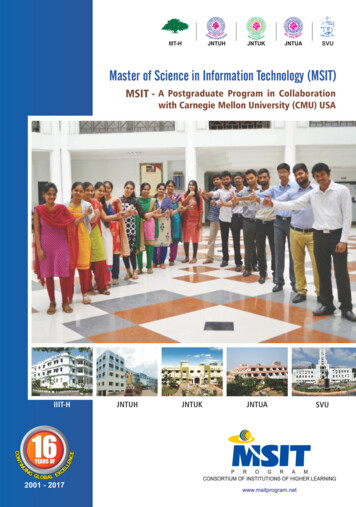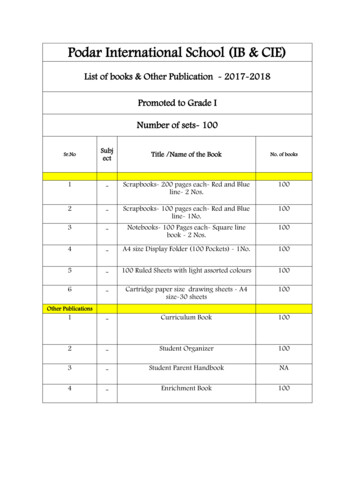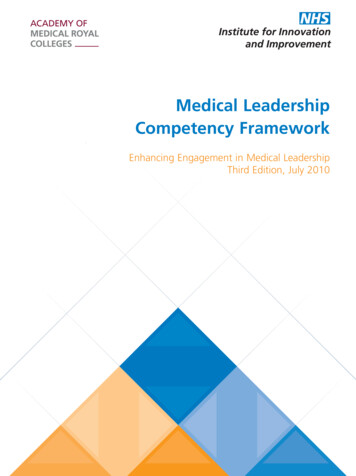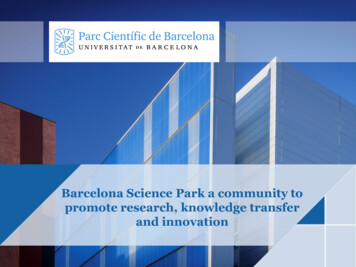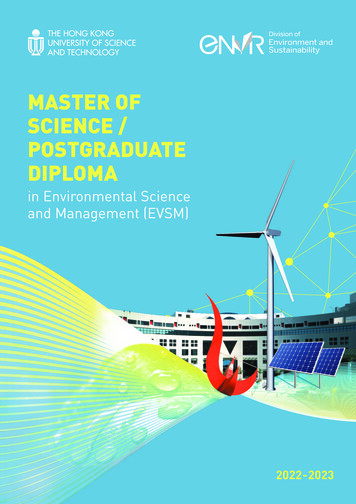
Transcription
MASTER OFSCIENCE /POSTGRADUATEDIPLOMAin Environmental Scienceand Management (EVSM)2022-2023
ENVIRONMENTALSCIENCE ANDMANAGEMENT (EVSM)The Hong Kong Special Administrative Region (HKSAR) has made the improvement of its environment a highpriority to ensure sound future development. The Government has established mechanisms and agencies tosupport initiatives for promoting research, education and community programs in environmental protection.The Hong Kong University of Science and Technology (HKUST) is making significant contributions tothese initiatives by innovative and relevant research and interdisciplinary postgraduate programs. TheMaster of Science (MSc) and Postgraduate Diploma (PGD) in Environmental Science and Management(EVSM) are unique programs that provide professional training for graduates to prepare themselves todeal with the rapidly developing environmental issues in Hong Kong and the world.The multi-disciplinary programs encompass science, engineering and management courses. Studentswill not only be trained on advanced Environmental Science and Environmental Management courses,they will also have the unique opportunity to take several engineering electives to broaden their horizons.In coping with the global trend on the demand for environmental management professionals, theEnvironmental Science and Management program was transformed from the Environmental Scienceprogram in 2010. The MSc/PGD in EVSM now provides a wealth of scientific, engineering and managementcourses to those who want to advance their career in environmental science and management.OBJECTIVES To strengthen student’s professional status with updated and advancedknowledge and development in important and emerging environmental issuesand concepts. To enhance student’s ability in applying latest environmental concepts(technologies or management strategies) to local, regional and globalenvironmental problems. To provide professional and interdisciplinary training for graduates to preparethemselves to tackle the rapidly developing environmental issues in HongKong and the surrounding region. To cultivate student’s stewardship towards sustainable development in theirprofessional industries and sectors.NORMATIVE PROGRAM DURATION MSc Degree: 1 - 1.5 years for full-time and 2.5 years for part-time study Postgraduate Diploma: 1 year for full-time and 1.5 years for part-time studyTARGET STUDENTSThe program is designed for students in government positions, environmentalconsulting firms, secondary school teachers, or recently graduatedundergraduates who wish to advance their knowledge and training inenvironmental science and management.2
ADMISSION REQUIREMENTSApplicants for admission to the MSc or PGD inEnvironmental Science and Management Program shouldhave a Bachelor degree with Second class honors or above.NORMATIVE PROGRAM SCHEDULE Full-time students should take a minimum of 9 creditsand up to a maximum of 15 credits per semester. Part-time students are normally expected to take 6 to amaximum of 9 credits (excluding MSc project) per semester.The nominal program fee only covers a registered studyperiod of 3 semesters for the PGD program and a registeredstudy period of 5 semesters for the MSc program. Studentsare required to pay HK 4,000 per credit for additionalcourse(s) taken beyond the nominal program requirementand HK 2,000 per credit for auditing course(s).CLASS SCHEDULEMajority of the lectures will be given on the weekdayevenings, with some during daytime on the weekdays andSaturday on the Clear Water Bay campus of HKUST. Each3-credit course includes three lecture hours per week, orin the case of 4-credit courses, three hours of lectures plustutorial section(s).CREDIT TRANSFERSubject to the approval of the Program Director and theUniversity regulations governing credit transfer, credittransfer may be granted for postgraduate courses withsatisfactory grades for appropriate environmental coursescompleted elsewhere. Application must be made to theProgram Director during the first semester after admission.Upon the approval of the Program Director, a maximum of9 credits can be transferred from other institutions to theMSc Program and a maximum of 6 credits to thePGD Program.PROGRAM TRANSFERStudents in the PGD Program may apply for transfer tothe MSc Program with the approval of the ProgramDirector, and vice versa. Students must apply for thetransfer at least one regular term prior to the completionof their program study.ACCOMMODATION ARRANGEMENTAdmission to the MSc/PGD program does not place theUniversity under any obligation to arrange or to assignon-campus or off-campus accommodation to students.Students admitted to the program are required to arrangeaccommodation on their own.GRADUATION REQUIREMENTSCourses will be assessed according to the grading schemeused for postgraduate courses at HKUST. Students in theMSc or PGD Program must complete the program witha graduation grade average (GGA) of 2.850 or above, asrequired for all postgraduate students at HKUST.TUITION FEESMaster of Science (MSc) in EVSM Program HK 120,000 (30 credits only)InstallmentDeadlineNon-refundable depositTo be paid upon offer is madeAmount (HK )Full-TimePart-Time30,00030,0001st installmentTo be paid in early Sep 202230,00030,0002nd installmentTo be paid in early Feb 202360,00030,0003rd installmentTo be paid in early Sep 2023-30,000Postgraduate Diploma (PGD) in EVSM Program HK 60,000 (15 credits only)Amount (HK le depositTo be paid upon offer is made15,00015,0001st installmentTo be paid in early Sep 202215,00015,0002nd installmentTo be paid in early Feb 202330,00015,0003rd installmentTo be paid in early Sep 2023-15,000Notes: 1/ Any additional credits are not covered by the fees stipulated above. 2/ Students admitted with credit transfer are also required to pay the nominal program fee.3/ Once the fee is paid, it is non-refundable.3
PROGRAM STRUCTURE AND CURRICULUMMaster of Science (MSc) in Environmental Scienceand Management Program (30 credits)Postgraduate Diploma (PGD) in Environmental Scienceand Management Program (15 credits) A minimum of 12 credits of foundation courses A minimum of 6 credits of foundation courses Up to 18 credits of electives, or electives plus MSc projects Up to 9 credits of electivesMASTER OF SCIENCE (MSC) / POSTGRADUATE DIPLOMA (PGD) IN ENVIRONMENTALSCIENCE AND MANAGEMENTFOUNDATION COURSESEnvironmental Management Courses ENVR5250 - Environmental Economics and Management ENVR5260 - Environmental Policy and Management3 credits3 credits EVSM5230 - Environmental Health and Management EVSM6070 - Environmental Impact Assessment (CEF course)3 credits4 creditsEnvironmental Science Courses ENVR5340 - Fundamentals of Sustainability Science and TechnologyEVSM5220 - Advanced Environmental ChemistryEVSM5240 - GIS for Environmental ProfessionalsEVSM5280 - Introduction to Atmospheric Aerosols3 credits3 credits3 credits3 creditsELECTIVE COURSESEnvironmental Management Courses ENVR5370 - Energy Systems, Sustainability, and PolicyENVR5380 - The Circular Economy – Institutions, Stakeholders and Modes of ImplementationENVR6090 - Special Topics in Environmental ManagementEVSM5270 - Environmental LawEVSM5300 - Corporate Environmental StrategyJEVE5900 - Carbon Management for Sustainable EnvironmentPPOL5190 - Policy Analysis and Design for Sustainable DevelopmentPPOL5210 - Environmental Policy and Natural Resource ManagementSOSC5620 - Sustainable Development3 credits3 credits1 - 4 credit(s)3 credits3 credits3 credits3 credits3 credits3 creditsEnvironmental Science Courses ENVR5290 - Climate Change: Science, Policy and ManagementENVR5310 - Atmospheric DynamicsENVR5320 - Environmental Data AnalysisENVR5350 - Climate DynamicsENVR5390 - Satellite Remote Sensing and InformaticsENVR6040 - Special Topics in Environmental ScienceENVR6050 - Introduction to OceanographyENVS5113 - Marine EcotoxicologyENVS5114 - Environmental Diseases and Microbiology3 credits3 credits3 credits3 credits3 credits1 - 4 credit(s)3 credits3 credits3 creditsOthers ENVR6100 - Independent studyEVSM6950 - MSc ProjectJEVE5260 - Air Pollution MeteorologyJEVE5320 - Water Quality and AssessmentJEVE5420 - Biological Waste Treatment and ManagementJEVE5460 - Design and Management of Physico / Chemical Processes of Environmental Engineering1 - 3 credit(s)3 or 6 credits3 credits3 credits3 credits3 creditsNotes: MSc (EVSM)/ Students are required to take a minimum of three Environmental Science courses and three Environmental Management courses. At least twoEnvironmental Science courses and two Environmental Management courses must be chosen from the Foundation Course List. The remaining one EnvironmentalScience course and one Environmental Management course can be from either the Foundation Course List or Elective Course List.PGD (EVSM)/ Students are required to take a minimum of two Environmental Science courses and two Environmental Management courses. At least oneEnvironmental Science course and one Environmental Management course must be chosen from the Foundation Course List. The remaining one EnvironmentalScience course and one Environmental Management course can be from either the Foundation Course List or Elective Course List.4
COURSE DESCRIPTIONSFOUNDATION COURSESEnvironmental Management CoursesENVR 5250 3 creditsEnvironmental Economics and ManagementThe course is designed to introduce students to keycontemporary concepts in environmental economics and equipthem with the approaches in economics that are generallyapplied to analyze environmental problems and policies.impact assessments will be analyzed. Environmental law,environmental management and the importance of publicparticipation will also be discussed. Case studies from HongKong will be used and comparison with EIA in MainlandChina will be made.Environmental Science CoursesENVR 5340 3 creditsFundamentals of Sustainability Science and TechnologyENVR 5260 3 creditsEnvironmental Policy and ManagementThis course focuses both on how to make and how to studyenvironmental policy and management. It will review majortheories related to the formulation of environmental policies,including government regulation and economic incentives, anddiscuss the types of policy measures implemented in variouspublic and business sectors. The discussion of environmentalproblems and policies will focus on examples that are relevantfor Hong Kong and the Chinese Mainland, but will also includethe experience of other countries and the debate surroundingglobal environmental issues.EVSM 5230 3 creditsEnvironmental Health and ManagementThe course will give an overview on environmental healthand management, including topics on outdoor and indoorenvironments, workplace environment, water and sewage,food, solid waste, hazardous waste, vectors and control,radiation, environmental health standards, natural andmanmade disasters, risk assessment and management,etc. Each topic will include nature of the issue, known andpotential health effects, control and regulatory approaches.More in-depth discussions will be given to occupationalhealth hazards, with emphases on current control methodsand technology.EVSM 6070 4 creditsEnvironmental Impact AssessmentIntroduction to environmental impact assessment (EIA)and the EIA process in Hong Kong. The components of anEIA report including air, noise, water, waste management,environment risk, ecological impact, and socio-economicThe course is intended to link the interaction betweenthe human and natural environment, focusing on how theanthropogenic activities have altered the natural environmentand provide an overview on the emerging science andtechnology of sustainability. This course will identifythe impacts associated with resource consumption andenvironmental pollution, and present the quantitative toolsnecessary for assessing environmental impacts and designfor sustainability. At the end of the course, the students shouldbe cognizant of the concept of sustainability, the metrics ofsustainability and be able to use the principles of sustainableengineering in their respective field of practice.EVSM 5220 3 creditsAdvanced Environmental ChemistryThe course provides an in-depth coverage of topics oninorganic and organic environmental contaminants, theirstructures, functions, sources and emissions, distribution,transformation and fate in the environment.EVSM 5240 3 creditsGIS for Environmental ProfessionalsIntroducing GIS concept, working with spatial data, managingGIS data, integrating GIS data with Google Earth/Map, remotesensing and model data, applying GIS technology to supportenvironmental planning and management.EVSM 5280 3 creditsIntroduction to Atmospheric AerosolsAtmospheric aerosols, also known as, airborne particulatematter, are important air pollutants affecting our health,visibility, and global climate change. This course aims toprovide a survey of the physical and chemical properties, thesource identification, the atmospheric transformation, thesampling of atmospheric aerosols, and the determination oftheir chemical compositions.5
ELECTIVE COURSESEnvironmental Management CoursesENVR 5370 3 creditsEnergy Systems, Sustainability, and PolicyThis course provides postgraduate students the opportunity toenhance their multidisciplinary understanding of sustainableenergy systems, transitions, and policy, with regards tothe need to deliver sustainable development for all andaccelerating climate action. With climate change accelerating,the ways we generate, distribute and use energy has been dulychallenged, opening up new opportunities to rethink a rapidshift from fossil fuel-based generation to the deployment ofsustainable energy systems. This course offers students awide range of topics from conventional to renewable energygeneration to electric mobility and transport to transmissionand storage to markets and multi-level policy approaches toeffect sustainable energy transitions. The course exposes thestudents to the sociotechnical nature of energy systems—inHong Kong, China, and internationally, and an understandingthat energy systems are not purely technological systems butare also embedded within politics and social dynamics.ENVR 5380 3 creditsThe Circular Economy – Institutions, Stakeholders andModes of ImplementationThis course provides an insight into the circular economy (CE)concept and its modes of implementation. While the centralfocus is laid on the CE development in China, comparisons withparticular CE elements from other countries such as Germany,Japan and the European Union will be conducted. The mainthematic content of this course are (1) institutional structures,(2) eco-industrial park estates and (3) waste management.ENVR 6090 1 - 4 credit(s)Special Topics in Environmental ManagementOfferings are announced each term, if deemed necessary,to cover emerging topics in environmental management notcovered in the present curriculum.EVSM 5270 3 creditsEnvironmental LawThe course will provide students with the basic legal conceptswhich include the hierarchy of courts in Hong Kong, thedifference between civil and criminal proceedings and theirpossible redresses or remedies available from the courts.Some important provisions of the basic environmentallegislation in Hong Kong, environmental prosecution policyof Hong Kong and how to instigate a judicial review against aministerial decision relating to the environment will also becovered in the course.EVSM 5300 3 creditsCorporate Environmental StrategyThe global environment will continue to degrade until thereare significant changes in business practices and consumerbehavior. This course will explore how environmental forcesare creating threats and opportunities for business. It looks at“best practices” of numerous companies in different industriesin order to understand how firms can reduce environmentalharm and also be profitable. It explores how current businesspractices evolved to be environmentally harmful and whythey are so “sticky” and resistant to change. The course usesreadings, lectures and case studies for its delivery.JEVE 5900 3 creditsCarbon Management for Sustainable EnvironmentThis course focuses on quantification and management ofGHG emissions. It includes organizational GHG inventories;measurement standards and protocols; carbon informationmanagement systems; low carbon solutions; carbon tradingand offsetting.PPOL 5190 3 creditsPolicy Analysis and Design for Sustainable DevelopmentSustainable development problems pose some of the greatestchallenges for policy makers around the world, and effectivepolicy design requires analysts with strong subject matterunderstanding, creativity, and the ability to incorporatediverse perspectives and approaches. The goal of this courseis to advance students’ abilities to apply tools and methods,including analytical techniques and presentation skills, whichare required for effective policy analysis and decision makingin this area. Coursework in the course will be largely casebased, and topical issues will be presented and masteredalongside different analytical skills and techniques.PPOL 5210 3 creditsEnvironmental Policy and Natural Resource ManagementThis course is intended for students interested inenvironmental policies and management of the naturalenvironment and its resources. The course provides studentswith a basic toolkit of quantitative and qualitative techniquesused in resource planning and analysis, together with casestudies with which to gain experience of their application.Students will also gain knowledge of regional and globaldirectives affecting the environment, as well as approachesto policy evaluation.6
SOSC 5620 3 creditsSustainable DevelopmentThis course is designed to give students an understandingof how government and business professionals formulatepolicies related to the foundations of sustainabledevelopment. The course begins with an exploration into theconcept of prosperity and conventional view of developmentin the context of environmental limitations. From thatbasis we will consider the economic, political and socialramifications of sustainable development and investigate theneed for rejuvenation and innovation.Environmental Science CoursesENVR 5290 3 creditsClimate Change: Science, Policy and ManagementThis course prepares graduate students for thedevelopment of interdisciplinary research on environmentalscience, policy and management through a detailedinvestigation of climate change issues. Based on a reviewof the scientific research and models that have beendeveloped through international cooperation, studentswill discuss relevant approaches of atmospheric andoceanographic science and the likely consequencesin terms of climate change. In addition, the varioustechnologies of mitigation and adaptation will be surveyed,leading to a discussion of appropriate policies for managingclimate change at the global or national level.ENVR 5310 3 creditsAtmospheric DynamicsThe study of atmospheric motions is essential for a betterunderstanding of the relevant meteorological phenomena.This course introduces the conservation laws for primitiveequations and classical concepts in fluid dynamics,which will allow students to gain physical insight into thefundamental nature of atmospheric motions. This courseis suitable for students who require the foundation of fluiddynamics for advanced study in meteorology, oceanography,atmospheric and climate sciences.ENVR 5320 3 creditsEnvironmental Data AnalysisThis course is designed for students at the start of theirpostgraduate studies. The course will provide students withknowledge in understanding and using statistical methodsin environmental science and applications. Probabilitydistributions, parametric tests of significance against nonparametric tests, Monte Carlo methods, Principal ComponentAnalysis, etc. will be taught in the course facilitated byextensive use of real world problems as example.ENVR 5350 3 creditsClimate DynamicsThis course covers the dynamics of the atmosphere andocean and the coupled dynamics, which govern our weatherand climate. The course will introduce the essentialfeatures of the atmosphere and ocean circulation, aswell as theories about instabilities in geophysical fluids.Knowledge and skills for running weather and climatemodels and analyzing data are also practiced in the course.ENVR 5390 3 creditsSatellite Remote Sensing and InformaticsSatellite remote sensing technique measures geophysicalparameters from the electromagnetic energy emittedor reflected from the earth, and can be used to estimateearth surface characteristics, atmospheric compositionsand profiles, and meteorological processes. This courseprovides a brief overview of the fundamental essentialsto understand the remote sensing process, satellite dataproducts, and their applications in atmosphere, land,and ocean.ENVR 6040 1 - 4 credit(s)Special Topics in Environmental ScienceOfferings are announced each term, if deemed necessary,to cover emerging topics in environmental science notcovered in the present curriculum.ENVR 6050 3 creditsIntroduction to OceanographyAn introduction to the fundamentals of physical, chemical,geological, geochemical, and biological oceanography. Itunveils the mystery of the oceans including the formation ofthe continents, oceanic circulation, and formation of preciousminerals in the deep oceans; discovers ocean resources fromphytoplankton to fish. The course will lay the foundation forsustainable use of the oceans and discuss human threatssuch as global warming, overfishing, and coastal pollution.ENVS 5113 3 creditsMarine EcotoxicologyThis course introduces the impacts and toxic effects ofenvironmental pollutants on growth, morphology andspecies richness of marine organisms with emphasis atthe population, community and ecosystem level. Conceptsand methods to assess the impacts of toxicants in marineorganisms and environment will also be discussed.7
ENVS 5114 3 creditsEnvironmental Diseases and MicrobiologyThis course aims to study microorganisms in the naturalenvironment and their potential impacts on human beings.Pesticides, chemicals, radiation, air and water pollutionare the manmade hazards that are believed to contributeto human illness. Microorganisms or environmental agentscause airborne and waterborne infectious diseases as wellas microbial biodegradation of pollutants will alsobe discussed.OthersENVR 6100 1 - 3 credit(s)Independent StudyStudy on selected topics in environmental science under thesupervision of a faculty member. The course may be repeatedonce for credits if the topic is different. Graded P or F.JEVE 5260 3 creditsAir Pollution MeteorologyAtmospheric boundary layer, lapse rate, stability classification,atmospheric turbulence, dispersion modelling, boundary layerwind-tunnel.JEVE 5320 3 creditsWater Quality and AssessmentWater quality standards, chemical, physical and biologicalcontaminants in water. General laboratory measurementsand instrumental analysis based on optical, electricaland chromatography methods. Toxicity and BOD tests.Pathogenic micro-organisms and microbial examinationof water. Environmental sampling and quality control andassurance.JEVE 5420 3 creditsBiological Waste Treatment and ManagementEVSM 6950 3 or 6 creditsMSc ProjectAn independent project on selected topics in environmentalscience under the supervision of a faculty member.Participation of external organizations in these projects willbe particularly encouraged. The responsibility of control,administration and assessment of the projects rests withUniversity. The course may be repeated once for credits.This course is for MSc students only. Approval from instructoris required.Principles of secondary, biological treatment processes,including sewage sand filters, trickling filters, activatedsludge plants, lagoons, ponds, rotating biological contactors,aerobic and anaerobic digesters, and biological nutrientremoval. Management of waste treatment systemsand works.JEVE 5460 3 creditsDesign and Management of Physico/ChemicalProcesses of Environmental EngineeringPrinciples, design and management practices of physico/chemical treatment processes for removing contaminantsfrom drinking water and municipal wastewaters; includescoagulation and flocculation, sedimentation, air flotation,centrifugation, filtration, membrane, air stripping, carbonadsorption, disinfection, chemical oxidation processes,operation management and residual management.8
SCHOLARSHIPSUGC TARGETED TAUGHT POSTGRADUATEPROGRAMMES FELLOWSHIPS SCHEME(PRIORITY AREA: SUSTAINABLE CITY ANDREGIONAL DEVELOPMENT)(FOR LOCAL APPLICANTS ONLY)MSc in Environmental Science and Management hasbeen approved as one of the targeted programs of theFellowships Scheme. Local students who are admitted tothe program for both full-time and part-time modes willbe invited to submit applications for the fellowships. Toavoid double subsidy, students who are receiving otherforms of government scholarship (except student financialassistance) for pursuing the same program will not beconsidered, and the fellowship students are not eligible forCEF reimbursement. The fellowship students are requiredto pay a minimum tuition fee of HK 42,100, which is theprevailing rate of the UGC-funded programs, and thedifferences will be subsidized by the fellowships subject to acap of HK 120,000 for each student regardless of the actualstudy period of the program.ACADEMIC SCHOLARSHIP FOR MSC INENVIRONMENTAL SCIENCE ANDMANAGEMENT PROGRAMA merit-based scholarship of HK 20,000 will be offered totop students of the graduation class each academic year.the second HK 10,000 of the course fee respectively. Forclaiming CEF, claimant should pass BOTH the attendancerequirements and course assessments of the course, withthe attendance rate and overall mark of course assessmentsnot less than 80% and 50% respectively. For details, pleasecontact the Office of the Continuing Education Fund.(852) TENDED NON-MEANS-TESTED LOAN SCHEMEStudents of the MSc/PGD in EVSM program are eligible to applyfor the Extended Non-Means-Tested Loan Scheme, whichprovides financial assistance to students in the form of loan. Fordetails, please contact the Student Financial Assistance Agency.(852) ndary/enls/overview.htmAPPLICATION PROCEDURESAll applications should be submitted ssions/onlineapplication to Postgraduate Outreach and Admissions Team(PGOA) of HKUST before 1 June 2022 (Non-Local Applicants)/ 30 June 2022 (Local Applicants). Late applications may beconsidered on a first-come-first-serve basis until all spacesare filled.APPLICATION TIMETABLE FOR 2022/2023FINANCIAL ASSISTANCECONTINUING EDUCATION FUNDReimbursable CourseStudents who are Hong Kong residents and havesuccessfully completed the foundation course –Environmental Impact Assessment (CEF course code:21Z04168-1) in the MSc/PGD EVSM Program can applyfor reimbursement of course fee (HK 16,000) and may bereimbursed up to 80% for the first HK 10,000 and 60% forApplication starts on1 September 2021Application closes onNon-Local Applicants: 1 June 2022Local Applicants: 30 June 20229
FOK YING TUNG GRADUATE SCHOOLThe Hong Kong University of Science and TechnologyClear Water Bay, Kowloon, Hong Konghttps://pg.ust.hk/enquiryFOR FURTHER INFORMATIONMs. Sharon Chong Manager (Administration)Division of Environment and SustainabilityThe Hong Kong University of Science and Technology(852) 2358-8363 (852) 2335-9317http://www.envr.ust.hk
Environmental Science and Management program was transformed from the Environmental Science program in 2010. The MSc/PGD in EVSM now provides a wealth of scientific, engineering and management courses to those who want to advance their career in environmental science and management. ENVIRONMENTAL SCIENCE AND MANAGEMENT (EVSM) OBJECTIVES
